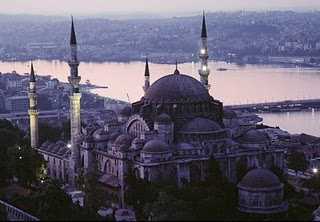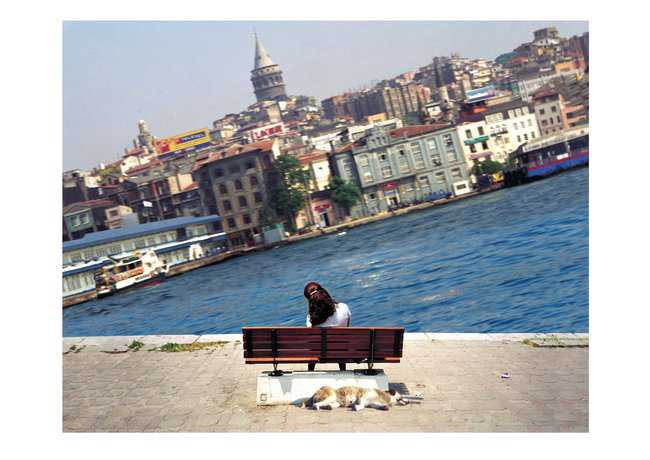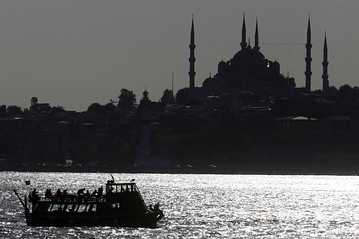Georgia’s conflict and Iran and Turkey
By Rayyan al-Shawaf
Commentary by
Tuesday, September 09, 2008
Although the Russo-Georgian military clash is over, its ramifications will be felt for a long time, especially as the political crisis between the two countries remains unresolved. In the Middle East, two major countries, Turkey and Iran, have been directly affected by the recent events. While Turkey stands to lose should Russia and Georgia fail to resolve their differences, Iran stands to win.
An embattled Russia cornered by the West would never forgive NATO member Turkey; as a result, Russian-Turkish relations would plummet and Russia might even stop providing Turkey with natural gas. In casting about for allies, Russia would find a similarly isolated Iran to be amenable to giving the two countries’ ties a strategic dimension, but only in return for political and economic concessions. Thus, the Russo-Georgian crisis may ironically change the balance of power in the Middle East.
Both Russia and Iran have become increasingly alarmed with the West’s attempts to bypass them in the quest for oil. Moscow wanted the Baku-Tbilisi-Ceyhan (BTC) pipeline, the world’s second longest, to pass through Russia. That way, Russia would not only benefit financially, but also be able to exert some control over the supply of oil to the West, much as it does with the longest pipeline in the world, the Druzhba, which flows from southeast Russia to Europe. During its invasion of Georgia, Russia pointedly demonstrated that it can threaten the BTC pipeline, and that, as Russian President Dmitry Medvedev recently put it, “Russia is a nation to be reckoned with.”
Meanwhile, Iran, most of whose oil flows to Asia, has long sought to lay oil pipelines to the West, a desire more often than not frustrated by Western sanctions. By supporting Russia in its current confrontation with the West, Tehran may have secured a future economic and political payoff. This would be especially true should Iran have extracted from Russia a commitment to devise a common oil strategy vis-a-vis the West.
However, even without this possibility, there are several indicators of the benefits that may accrue to Iran as a result of its pro-Russian policy. For example, Iranian (and Syrian) requests for a sophisticated missile defense system are being taken seriously in Moscow, much to the chagrin of the United States and Israel. When one remembers that Iran’s Bushehr nuclear plant – built with Russian support – is slated to begin operation in 2009, it becomes apparent that Iran may be on the verge of radically enhancing its regional and international position.
Even as Iran makes a bid for regional power status, Turkey has almost by accident emerged as the country that could hold the key to solving the Russo-Georgian crisis. Indeed, Turkey is exceptionally well-positioned to be mediator, a role it is already playing with some success between Syria and Israel, and to a lesser extent between Iran and the West. Russia is Turkey’s biggest trading partner, and Turkey is dependant on Russian natural gas. At the same time, Turkey maintains strong economic and military ties with Georgia, which aspires to join NATO, of which Turkey is a strategic member. Turkey cannot afford to allow its relations with Russia to deteriorate – they have already been strained by the passage of American ships through the Bosphorus on their way to the Georgian port of Batumi – but neither can it shun the West’s call for supporting Georgia. As a result, mediating the current conflict is not only a role that could propel Turkey into the limelight as a major regional player, but also a necessity insofar as Turkish politico-economic imperatives are concerned.
If Turkey meets the challenge, there may even be added benefits. Turkish-Armenian relations could thaw, which would be of great significance to the oil and natural gas industry. The most direct overland route for an oil pipeline from the Caspian Sea to Turkey would begin in Azerbaijan and pass through Armenia. Yet no such pipeline has ever been constructed due to political instability: Azerbaijan and Armenia fought a war over Nagorno-Karabakh and remain at loggerheads, while Turkey’s border with Armenia has been closed since 1993 in solidarity with Azerbaijan.
With the Russo-Georgian clash illustrating the vulnerability of Georgia, through which the BTC pipeline passes, Armenia’s importance has increased. Turkish President Abdullah Gul, on a groundbreaking visit to Yerevan last week for a Turkish-Armenian soccer match, spoke about the need for the countries of the Caucasus to work together to enhance stability. To that end, Turkey has called for the creation of a regional cooperation group comprising Turkey, Russia, Georgia, Armenia and Azerbaijan.
The trajectory of the Russo-Georgian conflict during the next few months could be critical in determining what happens in the Middle East. If mediation succeeds in bringing the two sides together and defusing the crisis, Russia will not find it necessary to turn to Iran. If the successful mediation is Turkish, then Turkey will have demonstrated a unique ability to bring stability to the Caucasus, broker Syrian-Israeli peace talks, and mediate between Iran and the West.
On the other hand, if the conflict drags on, Russia’s ties to the West and Turkey will inevitably deteriorate. Facing diplomatic isolation and possibly even sanctions, Russia may forge a strategic alliance with Iran, thereby drastically increasing Iranian influence in the Middle East.
\\\ a freelance writer and reviewer based in Beirut. He wrote this commentary for THE DAILY STAR.is
#






